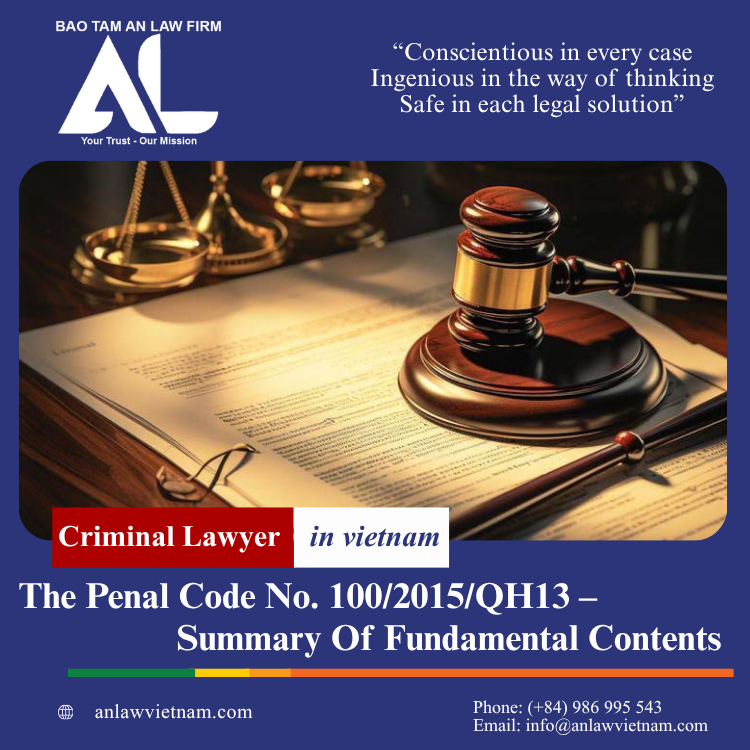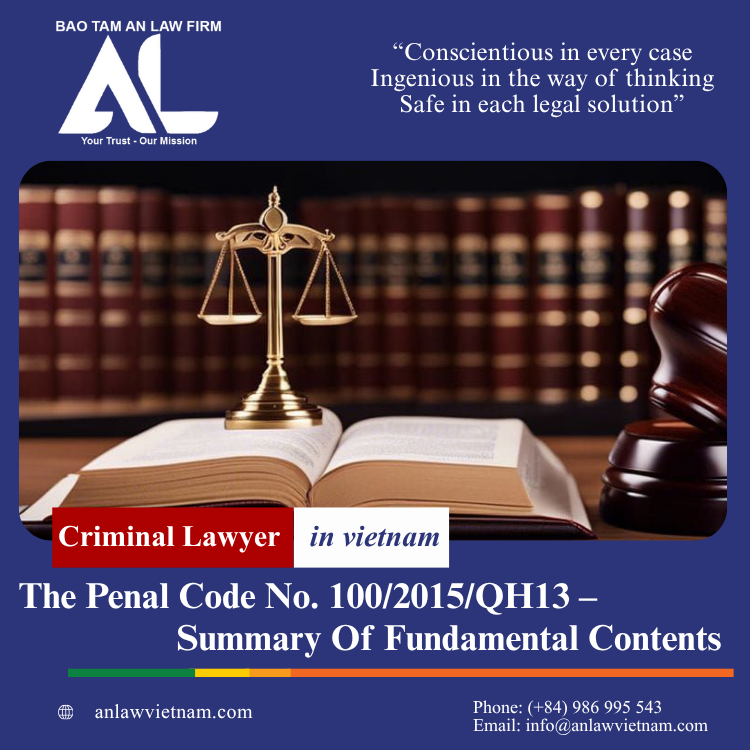The Penal Code No. 100/2015/QH13
When living, working, or expanding business operations in Vietnam, it is essential to have a clear understanding of the country’s Criminal Law – particularly the Penal Code No. 100/2015/QH13 (as amended and supplemented in 2017).
This Code defines acts constituting crimes and prescribes corresponding penalties applicable to both individuals and commercial legal entities, including foreign nationals and foreign-invested enterprises operating in Vietnam.
A sound understanding of Vietnam’s Criminal Law framework helps organizations and individuals prevent legal risks, ensure compliance, and safeguard their legitimate rights and interests while residing, working, or investing in Vietnam.
The following summary outlines the core contents, structure, and major amendments of the 2015 Penal Code, providing an accessible and comprehensive overview for foreign individuals, investors, and legal professionals interested in Vietnam’s legal system.
Click Download the Vietnamese Penal Code No. 100/2015/QH13
Overview
- Official Title: The Penal Code No. 100/2015/QH13
- Effective Date: January 1, 2018
- Amendments and Supplements: Law No. 12/2017/QH14
- Scope of Regulation: Crimes, penalties, criminal liability, and fundamental principles of criminal responsibility.
- Structure:
- Part One: General Provisions
- Part Two: Specific Crimes
- Total Provisions: 426 articles divided into 26 chapters.

Key Provisions of the 2015 Penal Code
Part One – General Provisions
This part establishes the foundation of Vietnam’s criminal law system, including:
- Fundamental Principles:
- Any act shall only constitute a crime when it is defined in the Penal Code.
- No one shall be convicted twice for the same act.
- Justice, humanity, leniency, and respect for human rights must be ensured.
- Subjects of Criminal Liability:
- Individuals: Persons aged 16 or older bear criminal liability for all crimes; persons aged 14–16 bear liability only for serious or particularly serious crimes.
- Commercial Legal Entities: For the first time, commercial entities may be held criminally liable for certain offenses in the fields of economy, environment, taxation, etc.
- Applicable Penalties:
- For individuals: Caution, fine, non-custodial reform, fixed-term imprisonment, life imprisonment, or death penalty.
- For legal entities: Fine, suspension of operation, prohibition from doing business, prohibition from raising capital, among others.
- Other Notable Provisions:
Statute of limitations, exemption from criminal liability, sentence reduction, expungement of criminal records, legitimate self-defense, necessity, preparation for crime, attempted crime, and complicity.
Part Two – Specific Crimes
The Penal Code classifies offenses into key groups as follows:
- Crimes infringing upon national security: Treason, espionage, terrorism, activities aimed at overthrowing the people’s government.
- Crimes infringing upon life, health, honor, and dignity: Murder, rape, kidnapping, abuse, etc.
- Crimes infringing upon property: Theft, robbery, fraud, and appropriation of assets.
- Drug Crimes: Production, trafficking, transportation, and possession of illegal narcotics.
- Crimes in economic, environmental, tax, securities, and information technology sectors.
- Crimes of corruption and abuse of position: Bribery, abuse of authority, irresponsibility causing serious consequences.
Major Amendments Compared to the 1999 Penal Code
- Introduction of corporate criminal liability for commercial entities.
- Reduction and abolition of the death penalty for certain offenses.
- Enhanced humanitarian and leniency policies, including exemption for voluntary surrender and cooperation.
- Broader application of fines and non-custodial reform.
- Decriminalization of certain acts, shifting to administrative or civil sanctions.
- Clearer differentiation of age-based criminal responsibility, ensuring protection of juveniles.
- Increased transparency and fairness in offense classification and sentencing.

Significance of the 2015 Penal Code
The Penal Code No. 100/2015/QH13 serves as a cornerstone of Vietnam’s legal system, contributing to:
- The protection of social order, safety, and human rights;
- Strengthening of socialist legality;
- Improvement of crime prevention and control;
- Adaptation to socio-economic development and international integration.
With extensive experience in defending complex Criminal Law cases — particularly those involving Drug Crimes, theft, robbery, gambling, and illegal gaming…
The Criminal Defense Team of An Law Vietnam is committed to safeguarding the lawful rights and interests of our clients.
The early involvement of An Law Vietnam criminal lawyers in legal proceedings is a crucial factor in helping clients protect themselves “wisely and effectively”
Contact:
An Law Vietnam – Professional, dedicated, and experienced criminal defense lawyers.
📞 Phone: (+84) 986 995 543
📧 Email: info@anlawvietnam.com
📍 Head Office: Diamond Plaza, 34 Le Duan Street, Sai Gon Ward, Ho Chi Minh City
🏢 Vung Tau Branch: Vo Thi Sau Street, Vung Tau Ward, Ho Chi Minh City
Related Articles:
Compilation of the Latest Guiding Instruments on the Criminal Code – 2025 Update
Drug Crime In Vietnam – Criminal Code (Amended And Supplemented In 2025)
Drug Crime in Vietnam – Typical Examples
Penalties for Foreigners Using Drugs in Vietnam – Understanding the Legal Risks
Can Foreigners Be Deported For Illegal Drug Use In Vietnam?
Decree No. 144/2021/NĐ-CP – Administrative Sanctions in the Fields of Security, Social Order, and Safety
